

Cultivating Digital Citizenship. Cyberbullying Toolkit. An Anti-Cyberbullying Toolkit for Educators This free toolkit has the resources schools need to take an effective stand against cyberbullying.
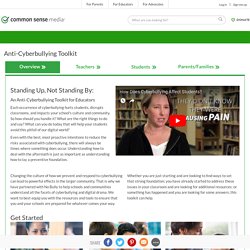
S.O.S. for Information Literacy. Google Digital Literacy and Citizenship Curriculum — ikeepsafe.org. Be Safe while Surfing Online - Learn How to Protect Yourself. There are many precautions you can take as a child, teen or young adult while surfing the Internet.
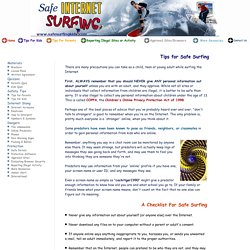
First, ALWAYS remember that you should NEVER give ANY personal information out about yourself unless you are with an adult, and they approve. While not all sites or individuals that collect information from children are illegal, it is better to be safe than sorry. It is also illegal to collect any personal information about children under the age of 13. This is called COPPA, the Children's Online Privacy Protection Act of 1998. Perhaps one of the best pieces of advice that you've probably heard over and over, "don't talk to strangers" is good to remember when you're on the Internet.
Some predators have even been known to pose as friends, neighbors, or classmates in order to gain personal information from kids who are online. Remember, anything you say in a chat room can be monitored by anyone else there. Digital Citizenship. Digital Citizenship is a concept which helps teachers, technology leaders and parents to understand what students/children/technology users should know to use technology appropriately.
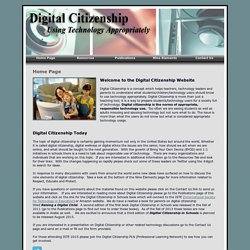
Digital Citizenship is more than just a teaching tool; it is a way to prepare students/technology users for a society full of technology. Digital citizenship is the norms of appropriate, responsible technology use. Nine Elements. Nine Themes of Digital Citizenship Digital citizenship can be defined as the norms of appropriate, responsible behavior with regard to technology use. 1.
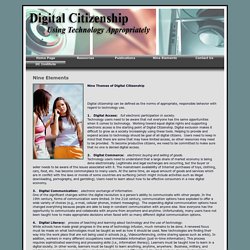
Digital Access: full electronic participation in society. Jo Cool or Jo Fool - For Kids. Digital Passport by Common Sense Media. Online Searching Strategies Infographic. Building Good Search Skills: What Students Need to Know. Getty The Internet has made researching subjects deceptively effortless for students — or so it may seem to them at first.
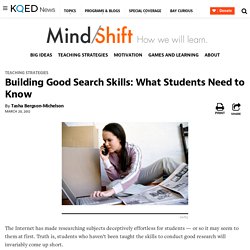
Truth is, students who haven’t been taught the skills to conduct good research will invariably come up short. That’s part of the argument made by Wheaton College Professor Alan Jacobs in The Atlantic, who says the ease of search and user interface of fee-based databases have failed to keep up with those of free search engines. In combination with the well-documented gaps in students’ search skills, he suggests that this creates a perfect storm for the abandonment of scholarly databases in favor of search engines. He concludes: “Maybe our greater emphasis shouldn’t be on training users to work with bad search tools, but to improve the search tools.” His article is responding to a larger, ongoing conversation about whether the ubiquity of Web search is good or bad for serious research. 15 Lesson Plans For Making Students Better Researchers. Your students are probably Internet authorities.
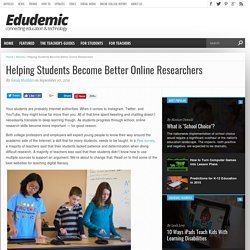
When it comes to Instagram, Twitter, and YouTube, they might know far more than you. The 6 Online Research Skills Your Students Need. 1.
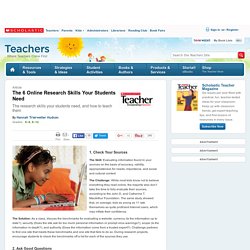
Check Your Sources The Skill: Evaluating information found in your sources on the basis of accuracy, validity, appropriateness for needs, importance, and social and cultural context The Challenge: While most kids know not to believe everything they read online, the majority also don’t take the time to fully evaluate their sources, according to the John D. and Catherine T. MacArthur Foundation. The same study showed that, on average, kids as young as 11 rate themselves as quite proficient Internet users, which may inflate their confidence.
The Solution: As a class, discuss the benchmarks for evaluating a website: currency (Is the information up to date?) Critical Evaluation. Key Questions to Consider When Evaluating Information. Question Your Media: Vet It Before You Share It. Do you trust everything you read?

Hopefully not — 84% of Millennials acknowledge that news and information is presented with some bias. It’s only when you train yourself to be “media literate” that you can look past the surface of information. And once you decide what’s truthful, you can create and share your own messages. Media literacy is an approach to deciphering data, including the ability to access, analyze, evaluate, and communicate information in all forms, from ads to blogs to online news.
It allows you to critically question methods of communication and better understand the role of media in society. Hoax or No Hoax? Strategies for Online Comprehension and Evaluation. Home › Classroom Resources › Lesson Plans Lesson Plan Student Objectives Session 1 Session 2.
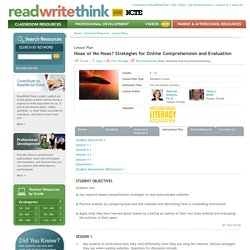
Identifying Reliable Sources and Citing Them. Plagiarism and Citation Basics. OWL. Coming Soon: A new look for our same great content! We're working hard this summer on a redesign of the Purdue OWL. Worry not! Our navigation menu and content will remain largely the same. If you are having trouble locating a specific resource, please visit the search page or the Site Map. The Online Writing Lab (OWL) at Purdue University houses writing resources and instructional material, and we provide these as a free service of the Writing Lab at Purdue.
For more information about services for the Purdue University community, including one-to-one consultations, ESL conversation groups and workshops, please visit the Writing Lab site. Mission The Purdue University Writing Lab and Purdue Online Writing Lab (OWL) assist clients in their development as writers—no matter what their skill level—with on-campus consultations, online participation, and community engagement. Put Some Excitement into Citations! As an English teacher, I struggled to teach my students to use MLA citations.
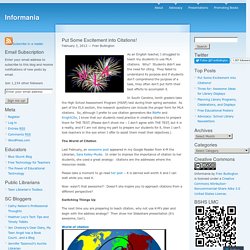
Why? Students didn’t see the need for citing. The World of Citation. I was going to start this post by saying, "Citation is one of the hardest things I teach" but then I thought about it and realized that there's nothing I teach where I think, "Hey, no problem, everyone understands that immediately. " But citation is definitely one of the most frustrating things I teach, because it can be such an abstract idea for students. Why, they want to know, do they have to include all those details? And why would anyone care what order the information was in? Can't they just throw in a title and a URL and be done with it already?
Students do seem to have a sense of why it's important to give credit to their sources, and I do use (and love) NoodleTools to help them with the citation process, but I was still getting a lot of push back on the "why" of the details citation. Plagiarism Game - Snowden Library. Free High-Resolution Photos. Vintage and Modern Free Public Domain Images Archive Download - Public Domain Images.
Stock photos that don’t suck. Free Clip Art & Images - Millions of Royalty Free Images. Morguefile.com free stock photos.